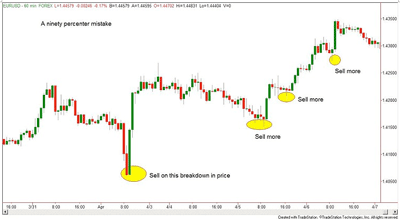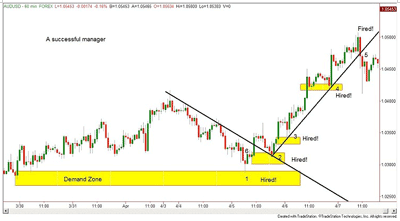By treating your positions more like employees, traders can become better equipped to cut losers and let the winners run, says Rick Wright, instructor at Online Trading Academy, both core traits of the 10% of all traders who succeed in the markets.
This week we will delve a bit into the psychology of managing your trades and how similar it is to managing good and bad employees. One of the questions I ask of every class is, "Has anyone ever been in charge of hiring and firing employees, either from running your own business or being in management?" Usually, well over half the class raise their hands.
Trading is very similar in this regard. How many of you have had that distinct pleasure? When you had an employee who came to work late, took two-hour lunches, left early, and stole your office supplies, what did/would you do with that employee?
My expectation is that you would fire them. Now, if you had an employee that came in early, ate lunch at her desk, worked late, and came up with great ideas to make your workplace more efficient, what would you do? Ask if she had any friends or family who were just like her so you could hire them as well.
We must treat our trades in exactly the same way. The "90 percenters" out there do it just the opposite. (As a reminder, a "90 percenter" is one of the 90% of traders in this vast world of trading who never make money consistently. It doesn't mean that they are wrong on 90% of their trades, it means that they are probably making one or more of the major mistakes we talk about every week.)
If a trade is going the wrong direction in your account, your job is to get rid of that trade. (Fire that employee.)
My personal philosophy in the market is that I am not self-employed as a trader. The market is my boss and my trades are my employees. I am merely a manager of those employees.
What is one of the 90-percenter mistakes? Adding to a losing position, one that is going the wrong direction. Especially if their original reason for being in the trade is no longer valid. That is like having a terrible employee and trying to hire their slacker of a brother. Bad idea.
Here's a chart example of a bad employee (trade) that an unsuccessful forex trader might make:
If you were running a business, would you keep that employee around if he was stealing from you? Or worse, keep adding their family members and friends? That is what 90 percenters sometimes do and look what happens on the chart. That is a quick way to have your boss-the market-fire you. If you choose to do this, I hope your resume is up to date.
NEXT: Make Sure the Winners Stay Working for You
|pagebreak|A successful trader will allow his good employees (profitable trades) to keep working until they become bad employees. Eventually, they may all start to steal from you.
In the following chart, you hire (buy) at point 1. At points 2, 3, and 4, you are trying to hire this employee's friends and family (buy more) until the entire group become dishonest and lazy, in which case you fire them (sell) at point 5.
There are several ways to scale in to trades which are covered much more in depth in our classes. Always understand that no trend lasts forever and all employees (trades) will end up going against you eventually.
Here are the employees you want to be looking for:
Another 90-percenter mistake is to fire their employees just as they start doing a good job, i.e. cutting off winning trades too early.
There are many reasons for this: wanting to have one profitable trade after a string of losses, fear of a winner turning into a losing trade, etc. The 90 percenter may sell at point 6, later on wishing he hadn't, then hoping for a pullback to his original price to get back in. Successful traders/managers allow those winners to keep running. Always keep in mind that trading is a marathon, not a 100-yard dash (or 100-meter dash for you traders around the world).
Having a small string of losing trades is just part of the business. As long as your losses are small and your winners large, you can be a great manager at the end of the year!
Hopefully, this change in psychology helps with your trading.
By Rick Wright, instructor, Online Trading Academy











